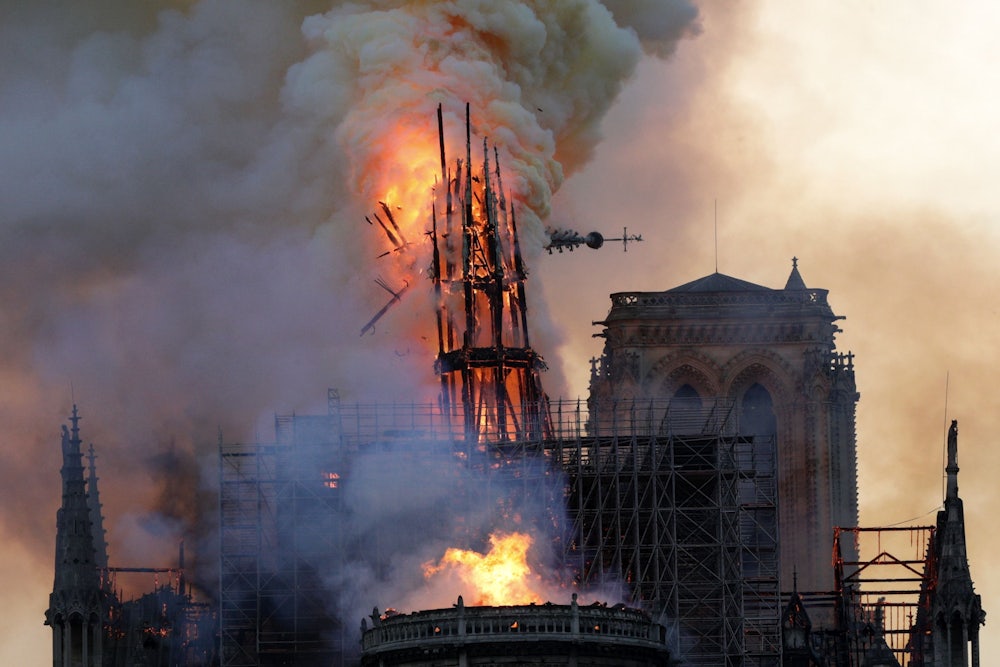Like many people, I have an image in my memory (and Instagram history) of the spire of Notre Dame in perfect Parisian light, in my case a rich, peach-sherbet evening in May. Also like many people, I have an indelible memory of an uncannily beautiful September morning in 2001. The memory returned to me this afternoon when my screen filled with images of a burning spire tilting and collapsing in Paris—Notre Dame’s destruction an eerie visual echo of those two towers in New York.
So I am full of sympathy with the outpouring of meaning-making in its wake: for online observers declaring, as several have, that helplessly watching an eight-centuries-old emblem of civilization burn is the epitome of 2019. I sympathize less with premature speculation about whether the fire might have begun in arson, and if so by whom.
There is sure to be much more of both responses—a rending of garments in this age when dumpster fires seem to spread to civilization itself, and dark warnings about the fate of the West. A cathedral, after all, is built to be a symbol. And catastrophe has always felt symbolic, from whatever historic floods prompted the Biblical story of Noah, to the Lisbon Earthquake of 1755, which called God’s ways into question for philosophers, to Pat Robertson’s odious claim that Haiti’s 2010 earthquake was punishment for a “pact with the devil.” Our minds leap to find meaning in the flames, not least in a time when so much in our politics and public life feels fragile and aflame.
Hannah Arendt wrote in The Human Condition that the meaning of an age comes from the rare and exemplary acts that define it. It is a charismatic idea. But nothing has done more harm in this young millennium than seeing the time in the Arendtian light of its most dramatic acts. Think—as this day has made everyone do—a little longer about the terrible spectacles of terror attacks, from the collapsing World Trade Center towers to the metro bombings in Madrid and London to the massacres in Mumbai. These crimes demanded interpretation. Their interpreters christened this the age of terror, and gave the age its mission: a global war on Islamic extremism. Terrible and futile invasions came next. All of this was the crucible for the Islamophobia that is now inflecting reckless speculation about Notre Dame—and powering President Trump’s despicable effort to associate Congresswoman Ilhan Omar with the terrorists of September 11, complete with images of those towers burning and collapsing. Our symbols tend to get away from us.
One of the highest disciplines of civilization is to resist overloading catastrophe with meaning, turning it into symbol and portent. People who can do this are resistant both to the political strategy of terrorism and to its more dangerous counterpart, the politics of fear, elevating hyper-security above all other goods. We should assume and hope that the fire at Notre Dame is an accident, but also realize how we are seeing it through the lens of other catastrophes, in light of the theater of terror and the grotesque tragedies of our politics.
Even when we are the victims of catastrophe, we should refuse to be the audience. Meaninglessness is terrible, which is why the recourse to meaning-making is automatic, even addictive. But interpretation in terms of a general catastrophe, in terms of the state of the world at large, may be worse still.
The best responses to this catastrophe recall, amid the grief, that Notre Dame’s spire was a nineteenth-century restoration by Eugene Viollet-le-Duc, replacing an original that was taken down in the reign of Louis XVI. Most constructions, all cities, every culture, are constantly rebuilt in the midst of damage and loss. Mourning and renewal are linked together as long as the world goes on. Loss is its own meaning. And civilization is the story of rebuilding.
